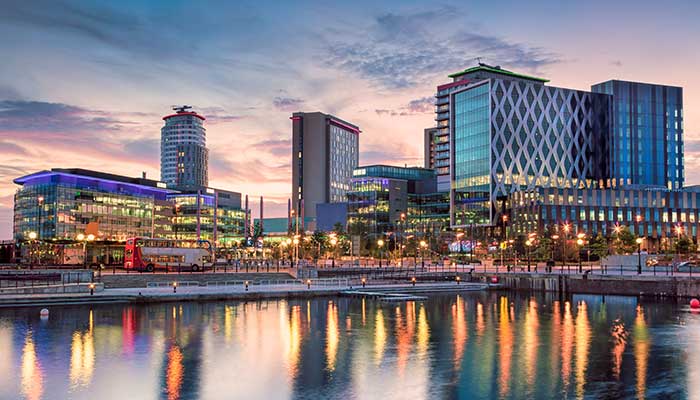
Photo: Shutterstock
The Centre for Cities think-tank yesterday published its analysis of the economic impact of relocating the BBC to Salford, which it states brought jobs to MediaCityUK, a 200-acre mixed-use property development in the city, but little positive impact to employment across the wider Manchester area.
However, these findings have been disputed by the Greater Manchester Combined Authority, which labeled the report “flawed” and hailed the BBC’s relocation a “stunning success”.
When the BBC moved in 2011 it was claimed the relocation would bring up to 15,000 jobs to the wider region.
MediaCityUK gained 4,600 new jobs between 2011 and 2016, a 43% increase. Out of those posts, 4,000 were in the media including 2,000 appointments in the BBC’s national operations which had moved to the area, according to Centre for Cities.
However, its report states 1,200 of these jobs were simply relocating to the area from existing firms in other parts of Greater Manchester rather than new start ups, including 640 BBC jobs that moved from the old Manchester city centre headquarters.
Only 145 jobs were created in MediaCityUK by firms that moved all their operations from elsewhere in the country before 2011, showing that very few employers followed the BBC’s lead in relocating to Salford.
Centre of Cities claims the impact of the BBC relocation on employment across Greater Manchester was negligible. Excluding new jobs at MediaCityUK in businesses already based elsewhere in Greater Manchester before 2011, the think-tank said the BBC’s move brought around 4,420 new jobs to the wider city region – equivalent to only 0.3% of total employment in Greater Manchester.
Paul Swinney, principal economist at Centre for Cities, said: “The impact of the BBC’s relocation shows that the government and city leaders should not overestimate the economic benefits of moving public sector jobs from London to other parts of the country.
“While the BBC’s move has been positive for Greater Manchester in other ways, it has done little to create new jobs across the city region, or to encourage new businesses to set up in the area.”
He added that this should serve as a lesson to cities bidding to become the new home of Channel 4 as they should not expect to see a major boost their economies beyond the jobs that are directly brought there.
“More broadly, cities need to weigh up the costs of efforts to attract public bodies and jobs, as these resources might be better used to address skills-gaps or improve transport infrastructure instead,” he concluded.
But Sean Anstee, Greater Manchester Combined Authority’s lead for employment and skills, said: “The BBC’s move to Salford has benefited not just Salford, but Greater Manchester as a whole and indeed the entire North West.
“As well as the direct benefits of the thousands of people that are now employed across Greater Manchester as a result of the BBC’s relocation, the move North has been instrumental in sparking a creative and digital revolution in the city region”
Mike Blackburn, chair of the Greater Manchester LEP, dubbed the report “ridiculous”.
He said: “The report is flawed, is far too narrow and fails to calculate the wider economic impact of jobs and the [gross value added] of direct and non-direct BBC employees and their families and the benefit to the wider economy.”



















